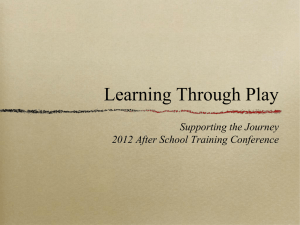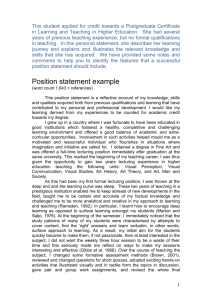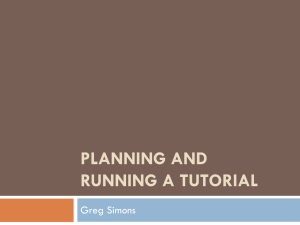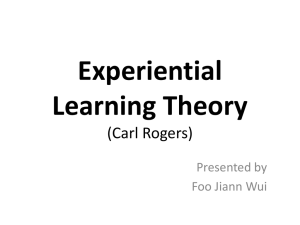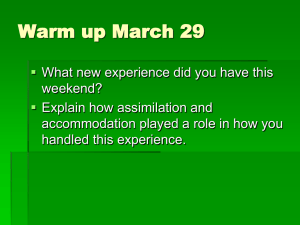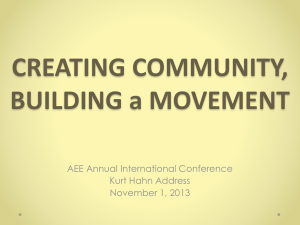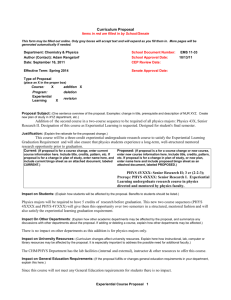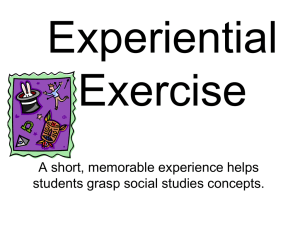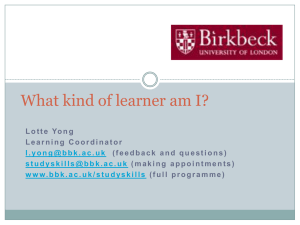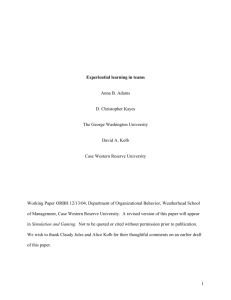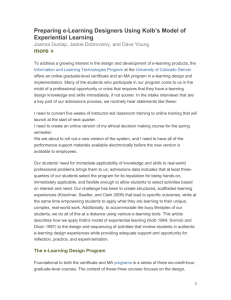Lecture Notes
advertisement
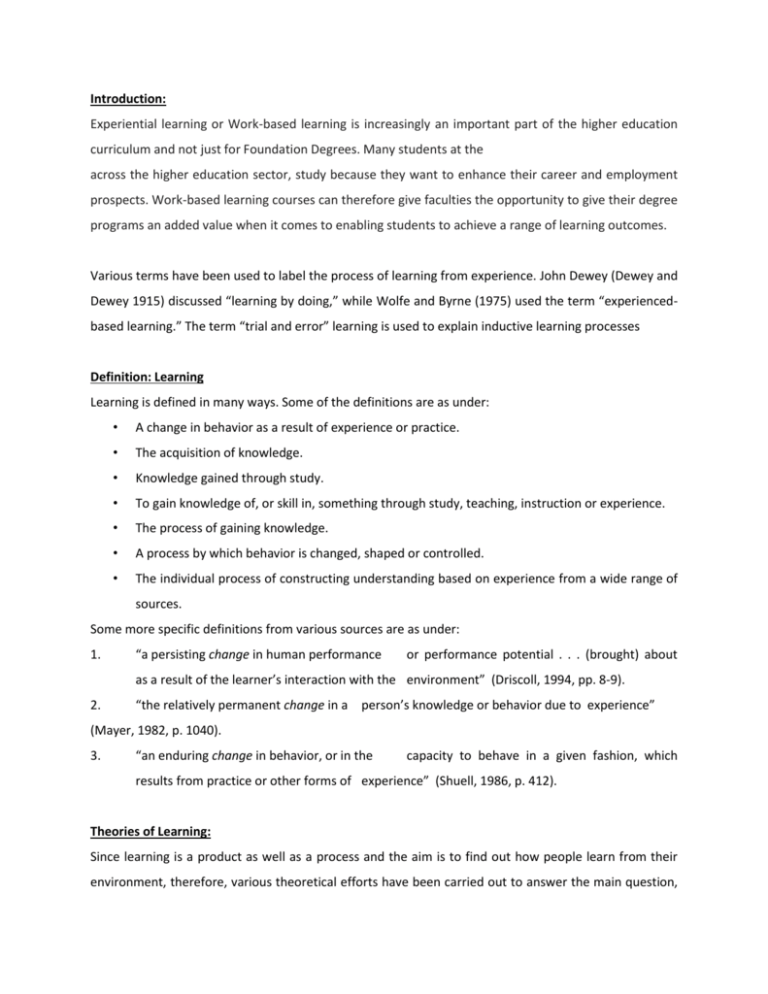
Introduction: Experiential learning or Work-based learning is increasingly an important part of the higher education curriculum and not just for Foundation Degrees. Many students at the across the higher education sector, study because they want to enhance their career and employment prospects. Work-based learning courses can therefore give faculties the opportunity to give their degree programs an added value when it comes to enabling students to achieve a range of learning outcomes. Various terms have been used to label the process of learning from experience. John Dewey (Dewey and Dewey 1915) discussed “learning by doing,” while Wolfe and Byrne (1975) used the term “experiencedbased learning.” The term “trial and error” learning is used to explain inductive learning processes Definition: Learning Learning is defined in many ways. Some of the definitions are as under: • A change in behavior as a result of experience or practice. • The acquisition of knowledge. • Knowledge gained through study. • To gain knowledge of, or skill in, something through study, teaching, instruction or experience. • The process of gaining knowledge. • A process by which behavior is changed, shaped or controlled. • The individual process of constructing understanding based on experience from a wide range of sources. Some more specific definitions from various sources are as under: 1. “a persisting change in human performance or performance potential . . . (brought) about as a result of the learner’s interaction with the environment” (Driscoll, 1994, pp. 8-9). 2. “the relatively permanent change in a person’s knowledge or behavior due to experience” (Mayer, 1982, p. 1040). 3. “an enduring change in behavior, or in the capacity to behave in a given fashion, which results from practice or other forms of experience” (Shuell, 1986, p. 412). Theories of Learning: Since learning is a product as well as a process and the aim is to find out how people learn from their environment, therefore, various theoretical efforts have been carried out to answer the main question, that How Do People Learn? Although there are many theories in this regards, the current material only focuses on the main most important theories of learning, namely; 1. Behaviorism 2. Cognitivism 3. Social Learning Theory 4. Social Constructivism 5. Multiple Intelligences 6. Brain-Based Learning Behaviorism Behaviorism as a theory was primarily developed by B. F. Skinner. It loosely encompasses the work of people like Edward Thorndike, Tolman, Guthrie, and Hull. What characterizes these investigators are their underlying assumptions about the process of learning. In essence, three basic assumptions are held to be true.First, learning is manifested by a change in behavior. Second, the environment shapes behavior. And third, the principles of contiguity (how close in time two events must be for a bond to be formed) and reinforcement (any means of increasing the likelihood that an event will be repeated) are central to explaining the learning process. For behaviorism, learning is the acquisition of new behavior through conditioning. There are two types of possible conditioning: Classical conditioning, where the behavior becomes a reflex response to an antecedent stimulus. Operant conditioning, where an antecedent stimuli is followed by a consequence of the behavior through a reward (reinforcement) or a punishment Cognitivism In psychology, cognitivism is a theoretical framework for understanding the mind that gained credence in the 1950s. The movement was a response to behaviorism, which cognitivists said neglected to explain cognition. "the psychology of learning which emphasizes human cognition or intelligence as a special endowment enabling man to form hypotheses and develop intellectually“. It is also known as cognitive development. Cognitive growth involves an interaction between basic human capabilities and "culturally invented technologies that serve as amplifiers of these capabilities“. These culturally invented technologies include not just obvious things such as computers and television, but also more abstract notions such as the way a culture categorizes phenomena, and language itself. Social Learning Theory Social learning theory (Bandura) posits that learning is a cognitive process that takes place in a social context and can occur purely through observation or direct instruction, even in the absence of motor reproduction or direct reinforcement. In addition to the observation of behavior, learning also occurs through the observation of rewards and punishments, a process known as vicarious reinforcement. The theory expands on traditional behavioral theories, in which behavior is governed solely by reinforcements, by placing emphasis on the important roles of various internal processes in the learning individual. Social Constructivism Constructivism views learning as a process in which the learners constructs knowledge based on their past experiences. The theory grew out of and in response to Cognitivism, framed around metacognition. Metacognition refers to higher order thinking which involves active control over the cognitive processes engaged in learning. Activities such as planning how to approach a given learning task, monitoring comprehension, and evaluating progress toward the completion of a task are metacognitive in nature. Metacognition – simply put is learning about learning, but more realistically, it’s about knowing who you are as a learner, and developing the capacity to leverage your strengths to your advantage while purposefully addressing your weaknesses Multiple Intelligences The theory posits that all people are born with eight intelligences: 1. Verbal-Linguistic 5. Musical 2. Visual-Spatial 6. Naturalist 3. Logical-Mathematical 7. Interpersonal 4. Kinesthetic 8. Intrapersonal Brain-Based Learning This theory grew out of Neuroscience & Constructivism. It has 12 governing principles, namely; 1. Brain is a parallel processor 7. Focused attention & peripheral perception 2. Whole body learning 8. Conscious & unconscious processes 3. A search for meaning 9. Several types of memory 4. Patterning 10. Embedded learning sticks 5. Emotions are critical 11. Challenge & threat 6. Processing of parts and wholes 12. Every brain is unique Experiential Learning: It is the process of learning through experience, and is more specifically defined as "learning through reflection on doing". Experiential learning is distinct from rote or didactic learning, in which the learner plays a comparatively passive role. It is related to but not synonymous with other forms of active learning such as action learning, adventure learning, free choice learning, cooperative learning, and service learning. Experiential learning is often used synonymously with the term "experiential education", but while experiential education is a broader philosophy of education, experiential learning considers the individual learning process. As such, compared to experiential education, experiential learning is concerned with more concrete issues related to the learner and the learning context. kolb's experiential learning theory (learning styles) model Kolb's learning theory sets out four distinct learning styles (or preferences), which are based on a fourstage learning cycle. (which might also be interpreted as a 'training cycle'). In this respect Kolb's model is particularly elegant, since it offers both a way to understand individual people's different learning styles, and also an explanation of a cycle of experiential learning that applies to us all. Kolb includes this 'cycle of learning' as a central principle his experiential learning theory, typically expressed as four-stage cycle of learning, in which 'immediate or concrete experiences' provide a basis for 'observations and reflections'. These 'observations and reflections' are assimilated and distilled into 'abstract concepts' producing new implications for action which can be 'actively tested' in turn creating new experiences. Kolb says that ideally (and by inference not always) this process represents a learning cycle or spiral where the learner 'touches all the bases', ie., a cycle of experiencing, reflecting, thinking, and acting. Immediate or concrete experiences lead to observations and reflections. These reflections are then assimilated (absorbed and translated) into abstract concepts with implications for action, which the person can actively test and experiment with, which in turn enable the creation of new experiences. Kolb's model therefore works on two levels - a four-stage cycle: 1. Concrete Experience - (CE) 2. Reflective Observation - (RO) 3. Abstract Conceptualization - (AC) 4. Active Experimentation - (AE) and a four-type definition of learning styles, (each representing the combination of two preferred styles, rather like a two-by-two matrix of the four-stage cycle styles, as illustrated below), for which Kolb used the terms: 1. Diverging (CE/RO) 2. Assimilating (AC/RO) 3. Converging (AC/AE) 4. Accommodating (CE/AE) Experiential Learning in Practice: Experiential learning is more of a practical methodology in which mostly learners gain knowledge by experience. Following methods are most common for experiential learning. • Work observation/job shadowing • Internship/practicum • Apprenticeship • Cooperative education • Work study plan • Consultancy project

